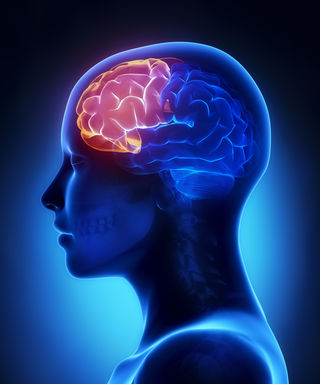Attention
Why Frontal Lobe Failure Impairs Memory in Dementia
The frontal lobes focus attention to create and retrieve memories.
Posted June 9, 2019 Reviewed by Gary Drevitch

When we think about an episode of our life, whether having coffee with a friend last week or our trip to Europe last year, we may re-experience blowing on that steaming mug of cappuccino or glimpsing the Eiffel Tower through the windows of the taxi. Our ability to mentally time-travel back to a prior time or place is one of the most amazing things our mind can do. But even in healthy individuals, memory is not always accurate. We may have trouble learning information. We may forget certain information or events. And we may experience a memory distortion or outright false memory—remembering things that never happened. All of these problems with memory happen more frequently in dementia. In this post, we will learn how the frontal lobes contribute to normal memory and what happens when they fail in dementia.
The frontal lobes focus attention to create and retrieve memories.
Your frontal lobes help you focus your attention to create and retrieve memories. They are located—as you would expect—in the front part of your brain, just behind your forehead. The frontal lobes help you choose exactly what you are paying attention to, which, in turn, determines what you will remember. Imagine you are having coffee with a friend. Think about all the different sights coming in from your eyes, sounds coming in from your ears, tastes and smells from your mouth and nose, and the thoughts and emotions arriving from other parts of your brain. The frontal lobes allow you to choose whether to pay attention to the conversation you are having with your friend, the bittersweet taste of the cappuccino, or the cute toddler running around the café. Whatever you chose to pay attention to, that is what you will remember.
It is also your frontal lobes that help you search for and retrieve a memory when you need it. So, when you are “trying to remember something,” such as where the café is located, it is your frontal lobes that are doing the “trying,” searching through your memories for the correct information.
Impaired attention due to frontal lobe dysfunction may lead to trouble learning and retrieving information.
Not paying enough attention is a common reason why people with dementia—and healthy individuals—have difficulty remembering new information. For example, if you are watching the football game and another person comes into the room and starts talking to you, you may not remember what the person said, because you focused too much of your attention on the game and too little on what the person was saying. Anyone who is distracted and not paying attention will find it difficult to remember new information.
Poor attention may also impair one’s ability to retrieve information. A common and normal example is when you walk into a room to do something, but then cannot remember what it was. What typically happens is that you walk in to get a particular item, see something else that triggers a new and different thought, become distracted, lose the focus of your attention, and then cannot remember what you walked in to get. For example, let’s say that you are going to the basement to change the laundry. You walk down the stairs and notice a box with your favorite Tony Bennett record in it. Seeing the record may distract you sufficiently such that you no longer remember what you went downstairs to do. This disruption of attention has interfered with your retrieval of the memory.
As mentioned above, it is the frontal lobes that allow us to focus our attention. It turns out that almost every cause of dementia damages either the frontal lobes directly or the important brain connections going to and from the frontal lobes. Because the frontal lobes are not functioning well, people with dementia frequently become distracted, stop paying attention, and experience difficulty learning and retrieving relevant information.
False and distorted memories are common in dementia.
We generally expect that when we retrieve a memory it will be accurate. It turns out, however, that memories frequently become distorted, mixed up with other memories, or otherwise confused. Have you ever thought that one of your friends told you something, but later realized it was a different friend? Although mixing up elements of memories occurs frequently in healthy individuals, it is even more common in those with dementia. Because the frontal lobes organize our memories, the increase in false memories in dementia may be another manifestation of the damage to the frontal lobes that occurs with dementia.
© Andrew E. Budson, MD, 2019, all rights reserved.
References
Budson AE, O’Connor MK. Seven Steps to Managing Your Memory: What’s Normal, What’s Not, and What to Do About It, New York: Oxford University Press, 2017.
Budson AE, Solomon PR. Memory Loss, Alzheimer’s Disease, & Dementia: A Practical Guide for Clinicians, 2nd Edition, Philadelphia: Elsevier Inc., 2016.


